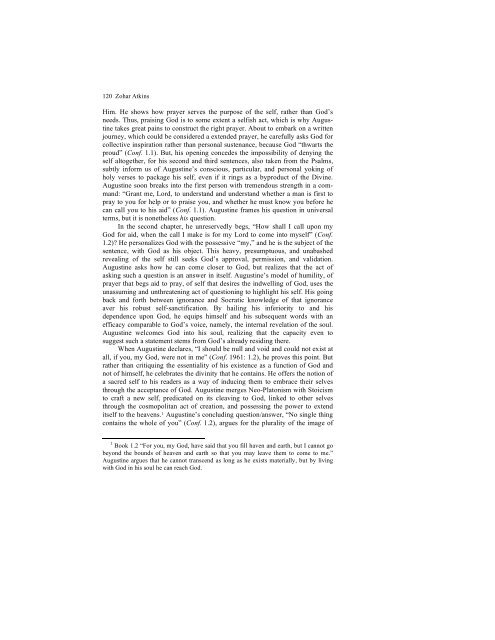Create successful ePaper yourself
Turn your PDF publications into a flip-book with our unique Google optimized e-Paper software.
120 Zohar Atkins<br />
Him. He shows how prayer serves the purpose of the self, rather than God’s<br />
needs. Thus, praising God is to some extent a selfish act, which is why Augustine<br />
takes great pains to construct the right prayer. About to embark on a written<br />
journey, which could be considered a extended prayer, he carefully asks God for<br />
collective inspiration rather than personal sustenance, because God “thwarts the<br />
proud” (Conf. 1.1). But, his opening concedes the impossibility of denying the<br />
self altogether, for his second and third sentences, also taken from the Psalms,<br />
subtly inform us of Augustine’s conscious, particular, and personal yoking of<br />
holy verses to package his self, even if it rings as a byproduct of the Divine.<br />
Augustine soon breaks into the first person with tremendous strength in a command:<br />
“Grant me, Lord, to understand and understand whether a man is first to<br />
pray to you for help or to praise you, and whether he must know you before he<br />
can call you to his aid” (Conf. 1.1). Augustine frames his question in universal<br />
terms, but it is nonetheless his question.<br />
In the second chapter, he unreservedly begs, “How shall I call upon my<br />
God for aid, when the call I make is for my Lord to come into myself” (Conf.<br />
1.2)? He personalizes God with the possessive “my,” and he is the subject of the<br />
sentence, with God as his object. This heavy, presumptuous, and unabashed<br />
revealing of the self still seeks God’s approval, permission, and validation.<br />
Augustine asks how he can come closer to God, but realizes that the act of<br />
asking such a question is an answer in itself. Augustine’s model of humility, of<br />
prayer that begs aid to pray, of self that desires the indwelling of God, uses the<br />
unassuming and unthreatening act of questioning to highlight his self. His going<br />
back and forth between ignorance and Socratic knowledge of that ignorance<br />
aver his robust self-sanctification. By hailing his inferiority to and his<br />
dependence upon God, he equips himself and his subsequent words with an<br />
efficacy comparable to God’s voice, namely, the internal revelation of the soul.<br />
Augustine welcomes God into his soul, realizing that the capacity even to<br />
suggest such a statement stems from God’s already residing there.<br />
When Augustine declares, “I should be null and void and could not exist at<br />
all, if you, my God, were not in me” (Conf. <strong>19</strong>61: 1.2), he proves this point. But<br />
rather than critiquing the essentiality of his existence as a function of God and<br />
not of himself, he celebrates the divinity that he contains. He offers the notion of<br />
a sacred self to his readers as a way of inducing them to embrace their selves<br />
through the acceptance of God. Augustine merges Neo-Platonism with Stoicism<br />
to craft a new self, predicated on its cleaving to God, linked to other selves<br />
through the cosmopolitan act of creation, and possessing the power to extend<br />
itself to the heavens. 1 Augustine’s concluding question/answer, “No single thing<br />
contains the whole of you” (Conf. 1.2), argues for the plurality of the image of<br />
1 Book 1.2 “For you, my God, have said that you fill haven and earth, but I cannot go<br />
beyond the bounds of heaven and earth so that you may leave them to come to me.”<br />
Augustine argues that he cannot transcend as long as he exists materially, but by living<br />
with God in his soul he can reach God.

















